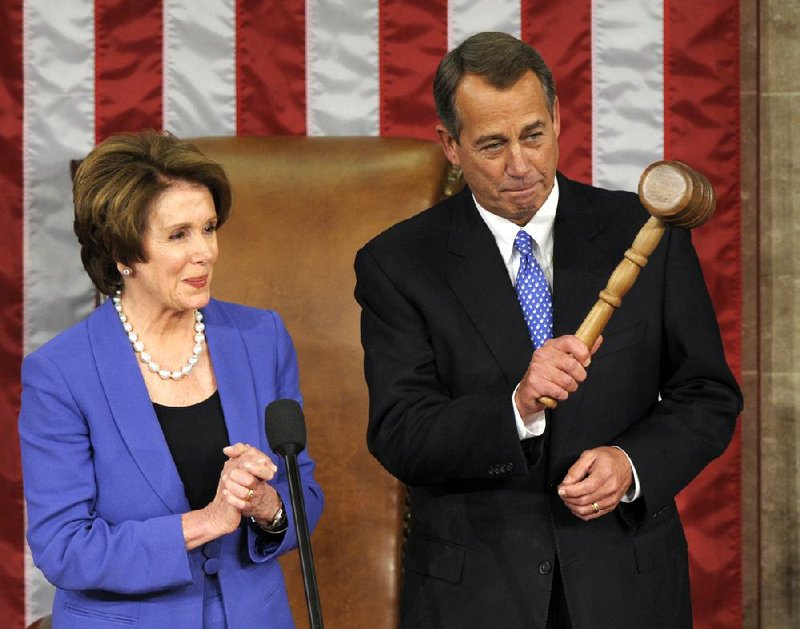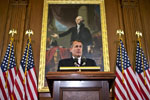WASHINGTON — U.S. Rep. John Boehner of Ohio was re-elected speaker of the House on Thursday despite some unrest among Republicans about his handling of recent fiscal negotiations with the White House and his decision to call off a vote on hurricane relief.
As the 113th Congress convened just after noon, Boehner weathered some protest votes from the rank and file to defeat Rep. Nancy Pelosi, the Democratic leader, by a vote of 220-192. Other candidates drew a total of 14 votes.
“Public service was never meant to be an easy living,” an emotional Boehner said after he took the gavel from Pelosi, referring to the tough decisions facing Congress. “Extraordinary challenges demand extraordinary leadership.”
But in a long, pomp-filled roll-call vote, nine Republicans voted against Boehner, and a handful of members refused to vote, signaling that divisions among House Republicans would continue from the 112th Congress into the 113th.
Some Republican conservatives registered their disapproval with the speaker by voting for others such as Eric Cantor of Virginia, the No. 2 House Republican; as well as Allen West, a conservative from Florida who lost his seat in the November election.
“I think it was a vote of no confidence,” said Rep. Tim Huelskamp, R-Kan., who voted for Jim Jordan of Ohio, a conservative Republican. “In this town, the intimidation was intense. There were a lot of members who wanted to vote no.”
Boehner was nominated for a second term as speaker by Rep. Cathy McMorris Rodgers of Washington, the Republican conference chairman, who predicted that he would lead the new Congress to tackle overhauls on the tax code, immigration laws and entitlements.
“What does he advise?” she asked of the man she hailed as a “regular guy.” “Don’t kick the can down the road.”
Boehner implored the assembly of newcomers and veterans in the 113th Congress to tackle the nation’s heavy burden of debt at long last.
“At $16 trillion and rising, our national debt is draining free enterprise and weakening the ship of state,” said Boehner. “The American dream is in peril so long as its namesake is weighed down by this anchor of debt. Break its hold and we will begin to set our economy free. Jobs will come home. Confidence will come back.”
Senate Majority Leader Harry Reid, D-Nev., said he, too, is ready for attempts to rein in federal spending, but laid down a few conditions. “Any future budget agreements must balance the need for thoughtful spending reductions with revenue from the wealthiest among us and closing wasteful tax loopholes,” he said.
The new Congress began with a few more Democrats than its predecessor had. The party now controls 55 Senate seats, up two from the previous Congress. In the House, Republicans have a 233-200 majority, down eight seats from the previous Congress.
The day opened with wishes for more civility and cooperation. But partisan battles already were brewing on issues such as samesex marriage, gun control, welfare programs and Medicare.
With Vice President Joe Biden presiding, the Senate convened and swore in 13 new members and witnessed the return of Republican Sen. Mark Kirk of Illinois, who had been away for a year recovering from a stroke. Among those joining the Senate was former Rep. Tim Scott of South Carolina, a Republican who replaced Jim DeMint. He is the only black member of the Senate, whose ranks of female members grew.
Senate Democrats stepped away from a threat to immediately ram through new rules to limit the power of Republicans to filibuster with a simple majority vote.
As a result, the first day of the 113th Congress is likely to be noted for what did not happen — a coup in the House, an unprecedented power play in the Senate — than what did.
But Reid promised to keep his options open as he continues negotiating with Republicans in search of a bipartisan agreement on new rules to unstick the Senate.
Meanwhile, the House adopted Republican-written rules for the chamber that reflect the party’s efforts to cut spending, stop government regulations and oppose same-sex marriage.
The House gaveled to a close the 112th Congress three minutes before noon to make way for the new session. Given the fight over the fiscal crisis that lasted right up until the end, lawmakers were conducting business almost to the final minute.
And there is plenty ahead for the newly constituted House and Senate.
Looming are showdowns between the Republican House and President Barack Obama over raising the government’s statutory borrowing limit in February and the expiration in March of a stopgap spending measure financing the government. In both instances, Republicans have vowed not to cooperate unless federal spending is cut sharply and work begins to shrink entitlement programs such as Medicare. Obama has been just as adamant in saying he is not prepared to negotiate over the full faith and credit of the U.S. government, which would be threatened if Congress refuses to raise the debt ceiling.
Traditionally, the House rules package reflects the majority party’s legislative positions and is opposed by the minority. The package passed in a mostly partyline vote of 228-196, with all four Arkansas Republicans in support.
Democrats tried unsuccessfully to include provisions against corporate political donations from secret contributors, ensuring that voters don’t wait in long lines and opposing intervention in same-sex marriage court cases.
The rules would allow the House to continue to intervene on behalf of the Defense of Marriage Act, which forbids same-sex marriage. The Supreme Court has agreed to take a look at the law, planning to hear two cases that challenge the government’s different treatment of homosexual Americans.
Cantor described the Republican rules as an effort to lay out a policy to address job creation, control of the growth of government and limit wasteful spending. He said the package includes proposals to:
Identify duplicative programs and examine the usefulness of existing government programs.
Make it easier to see how proposed legislation would interact with existing law.
Ensure that deliberations over legislation include the effects of government regulations.
Require that annual budget resolutions include information about welfare programs.
The new rules also authorize House lawyers to continue their pursuit of a contempt citation against Attorney General Eric Holder for not releasing documents pertaining to Operation Fast and Furious, a gun-running controversy still boiling in conservative circles. Another measure expands nepotism rules to preclude members from doing financial favors for their grandchildren, a change aimed squarely at Rep. Maxine Waters, D-Calif.
The House Ethics Committee in September cleared Waters of rules violations after a three-year investigation examining assistance to a bank with ties to her husband. But a special investigator said her chief of staff, who also is her grandson, might have acted improperly.
The 113th Congress began on a hopeful note when Kirk, returning for the first time in a year, emerged in front of the Senate. Biden greeted him with a hug and a “Welcome back, man.”
“It was a good debate,” Kirk replied. “I was rooting for you.”
Kirk, 53, was greeted by the Illinois delegation, as well as by most of his colleagues in the Senate. His face contorted in concentration, Kirk, using a cane and flanked by Biden and Sen. Joe Manchin, D-W.Va., began making his way up the steps of the Senate.
When he slowed near the top, his colleagues called out words of encouragement — “Almost there!” and “A few more!” — and then burst anew into applause when Kirk reached the top, triumphant.
The last day of the 112th Congress lasted three minutes, taken up largely by the opening prayer of the chaplain, the Rev. Patrick Conroy, who acknowledged “many struggles” and “many sorrows” in the past two years.
“May the work of the 112th issue forth to the benefits of the nation,” he intoned. “Where our work has fallen short, we ask your forgiveness.”
With that, Rep. Louie Gohmert, R-Texas, led the Pledge of Allegiance, and Boehner gaveled the end to one of the least productive Congresses in history.
Information for this article was contributed by Jonathan Weisman of The New York Times; by Larry Margasak, David Espo, Donna Cassata, Andrew Taylor and Henry C. Jackson of The Associated Press; and by David Lightman and William Douglas of McClatchy Newspapers.
Front Section, Pages 1 on 01/04/2013


